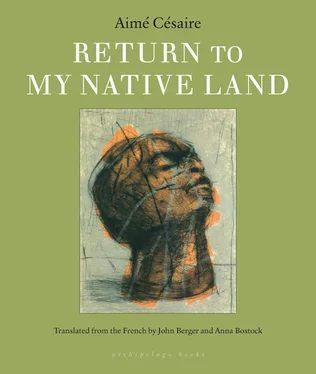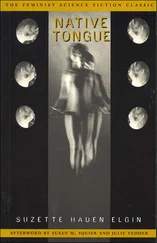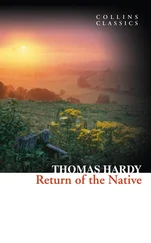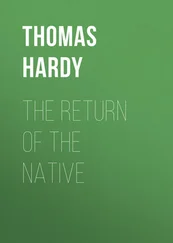Aime Cesaire
Return to my Native Land
This is not a free adaptation of Césaire’s work; neither, however, is it a completely literal translation. The poem is important because of its thinking content. The thinking is both political and poetic. Politically it is a poem of revolutionary passion and irony. Poetically its images have a physical and often sexual resonance. It is always in respect to this double content that we have sought and worked upon an English version. In close reading the original poem is sometimes obscure, and necessarily this obscurity remains in the translation; but in French this obscurity is only a detail to the lucid passion of the whole. We hope that this balance, or the equivalent of it, has been preserved for the English-language reader.
We wish to thank the following whom we consulted whilst working on this translation: Dorothy Baker, Jean-Paul Clébert, Peter Levi, Adrian Mitchell, Simone Mohr, Henri Stierlin, and Alain Tanner.
Anna Bostock, John Berger
October 1968
At the end of the small hours …
Get away, I said, you bastard of a cop, swine get away. I hate the livery of order and the fish-hooks of hope. Get away foul ju-ju, bedbug of a monk. Then I turned to dream for him and his lost ones’ paradises more calm than the face of a woman telling lies. Rocked there on the breath of inexhaustible thought, I fed the wind, set monsters free and heard a river of turtledoves and savannah clover rising on the far side of disaster: a river in my depths as deep as the brazen twentieth storey is high: a river to protect me against the corruptions of the dusk that are paced day and night by a damned venereal sun.
At the end of the small hours abud with the frail light of coves, hungry, hail-marked with smallpox, blown to bits by alcohol, the Antilles shipwrecked in the mud of this bay, wickedly shipwrecked in this town of dust.
At the end of the small hours: the last, deceiving sorry scab on the wound of the waters; the martyrs who refuse to bear witness; the fading flowers of blood scattered on the futile wind like the screeches of chattering parrots; an old life’s ingratiating smile, lips apart in deserted anguish, an old wretchedness decomposing in silence beneath the sun; an old silence broken by tepid pustules, the dreadful zero of our reason for living.
At the end of the small hours: the strand of dreams and the senseless awakening on this frail stratum of earth already humiliated by the greatness of its future when the volcanoes will erupt and naked waters sweep away the stains ripened by the sun till nothing is left but a tepid molten simmering pried over by sea birds.
At the end of the small hours: this town, flat, displayed, brought down by its common sense, inert, breathless under its geometric burden of crosses, forever starting again, sullen to its fate, dumb, thwarted in every degree, incapable of growing as the sap of its earth would have it grow, set upon, gnawed, reduced, cheating its own fauna and flora.
At the end of the small hours: this town, flat, displayed …
And in this town a clamouring crowd, a stranger to its own cry as the town, inert, is a stranger to its own movement and meaning, a crowd without concern, disowning its own true cry, the cry you’d like to hear because only that cry belongs to it, because that cry you know lives deep in some lair of darkness and pride in this disowning town, in this crowd deaf to its own cry of hunger and misery, revolt and hatred, in this crowd so strangely garrulous and dumb.
In this disowning town, this strange crowd which does not gather, does not mingle: this crowd that can so easily disengage itself, make off, slip away. This crowd which doesn’t know how to crowd, this crowd so perfectly alone beneath the sun: this crowd like a woman whose lyrical walk you have noticed but who suddenly calls upon a hypothetical rain and commands it not to fall; or makes the sign of the cross without visible reason; or assumes the sudden grave animality of a peasant woman urinating on her feet, stiff legs apart.
In this disowning town, this desolate crowd under the sun which rejects everything expressive, affirmative or free in the daylight of the earth which is its own earth. Which rejects Josephine, Empress of the French, dreaming high above the niggers. Rejects the liberator bound in his liberation of white stone. Rejects the conquistador. Rejects this contempt, this freedom, this daring.
At the end of the small hours: this disowning town and its wake of leprosies, consumption, famines, its wake of fears crouching in the ravines, hoisted in the trees, dug out of the soil, rudderless in the sky, piled together. This disowning town and its fumaroles of anguish.
At the end of the small hours, the forgotten Heights which have forgotten how to jump.
At the end of the small hours, the malarial blood of the Heights, wearing the shoes of worry and docility: reversing the sun of its own feverish pulse.
At the end of the small hours, the banked fire of the Heights, like a sob gagged before it breaks out in blood; the fire awaiting a spark that hides and denies itself.
At the end of the small hours, the Heights squatting in front of hunger pains, wary of thunderbolts and potholes, slowly vomiting their exhaustion of men, the Heights alone in their pool of blood, their bandages of shade, their gutters of fear, their great hands of wind.
At the end of the small hours, the famished Heights, and no one knows better than this dismal bastard of a hill, this Morne, why the suicide abetted by his epiglottis killed himself by rolling back his tongue to swallow it; why a woman looks like she is floating in the Capot river (her luminously dark body obedient to her navel’s command) and she is only a patch of ringing water.
Despite the energetic way they both have of drumming on his cropped skull, neither the teacher in his classroom nor the priest at catechism can get a single word from this half-asleep nigger child because his famished voice has been sucked down into the marsh of hunger (a-word-a-single-word and you-can-forget-about-Queen-Blanche-of-Castile, a-word-a-single-word, just-look-at-the-little-savage-he-doesn’t-know-a-single-one-of-God’s-ten-commandments)
for his voice has lost its mind in the marshes of hunger
and there is nothing, nothing to be got out of the little good-for-nothing
nothing but a hunger which can no longer climb the tackle of his voice
a heavy, flabby hunger
a hunger buried in the deepest heart of the Hunger of the famished Morne
At the end of the small hours, this nondescript beach for wrecks, the exacerbated odour of corruption, the monstrous sodomies of the host and the slaughterer, the unscalable ship’s prow of prejudice and stupidity, the prostitutions, hypocrisies, lusts, betrayals, lies, swindles, concussions — the breathlessness of petty cowardice, the wheeze of gushing enthusiasm, the greeds, hysterias, perversions, the harlequinades of misery, cripplings, itches, rashes, the luke-warm hammocks of degeneration.
This is the pageant of comic scrofulous swellings, of festers begun by the strangest microbes, of poisons without known antidote, of pus from old wounds, of unforeseen fermentations in rotting bodies.
At the end of the small hours, the great still night, the stars more dead than a burst balafong,
the monstrous bulb of the night, germinated from all our meanness and renunciations.
And our gestures, idiotic and mad, trying to bring back the golden shower of privileged moments, the umbilical cord redrawn in its frail splendour, the bread and wine of complicity, the bread, the wine, the blood of a true wedding.
Читать дальше












